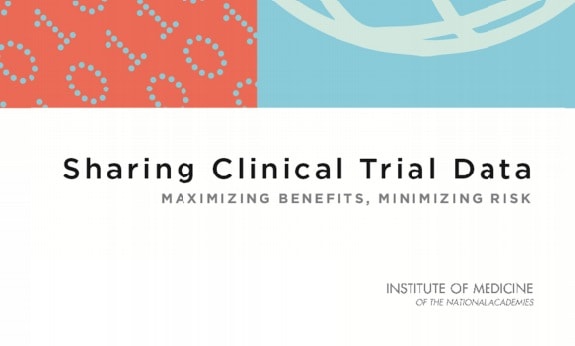
Sharing trial data should be ‘expected norm’ says US think-tank
pharmafile | January 15, 2015 | News story | Medical Communications, Research and Development, Sales and Marketing | FDA, Goldacre, Institute of Medicine, clinical trials, transparency
Clinical trial data is in the public interest and should be shared no less than 30 days following regulatory approval according to the Institute of Medicine, a policy advisor to the US government.
The committee producing the report that was sponsored by the FDA, the National Institutes of Health, public sector organisations and 17 pharma companies – was tasked with develop guiding principles and a framework for how pharma companies can responsibly share their clinical trial data.
It concludes that pharma companies should publish the data from which published results are drawn no later than six months after publication, and then publish the full data set no later than 18 months after study completion, or 30 days after regulatory approval.
The findings note that despite the objections from industry and lobbyists, that there are “compelling justifications for sharing clinical trial data to benefit society and future patients”.
It continues: “The challenge is to set clear expectations that clinical trial data should be shared and to agree on how to do so in a responsible manner that mitigates the risks involved.” It sets out four key recommendations for when and how pharma companies should share data from clinical trials:
- Register data sharing plans registered with the trial registration before the trial begins
- Publish summary results within a year of a trial’s end
- Share full data sets from a clinical trial within 18 months of the trial’s end
- Data sharing initiatives should be overseen by independent panels of experts and the public, and should be as transparent as possible.
The EMA passed rules mandating pharma companies to release more of their results from clinical trials, which came into force in January, following extensive and repeatedly delayed consultations between the Agency and stakeholders.
This will be followed by the new EU Clinical Trials Regulations which begin in May next year, and say that information from clinical trials should generally not be considered commercially confidential – thus removing the legal framework for pharma to not publish its data.
But there is still resistance to the move towards complete transparency, despite calls from within medicine and the industry. The EMA has been embroiled in high-profile legal spats with Abbive over publishing data on Humira (adalimumab), and Intermune for data on Esbriet (pirfenidone).
“The sharing of clinical trial data needs to be carried out in a way that maintains incentives for sponsors and researchers to develop new clinical trials and therapies and that sustains patients’ willingness to participate in them,” says Bernard Lo, chair of the Institute’s committee for strategies for responsible sharing of clinical trial data.
“Our recommendations attempt to balance the interests of different stakeholders with the public interest in having the best information possible regarding the effectiveness and safety of therapies.”
Victor Dzau, president of the Institute of Medicine, adds: “The rapidly changing landscape of clinical trials and the movement toward greater transparency create a need to establish professional standards and set expectations of how to share clinical trial data. The time is right to have the principles in this report serve as a guide for what specific clinical trial data to share, at what time, and under what conditions.”
But the committee stopped short of naming a specific body or authority for enforcing the recommendations, and did not call for audits for compliance – much to the disappointment of the founders of the ALLTrials campaign, the UK-led movement for greater transparency and data sharing from the pharma industry.
Professor Carl Heneghan, director of the centre for evidence-based medicine at the University of Oxford, says some of the recommendations are ‘disappointingly weak’.
“When the Institute of Medicine states there are ‘compelling justifications for sharing clinical trial data to benefit society and future patients,’ you would expect robust recommendations too. Providing metrics which are actionable, accessible and auditable is the key to effective data sharing.
“What is omitted from this report is a recommendation that trial sponsors and institutes should regularly audit their compliance with data sharing, which could provide a notable measure of quality of responsible sharing of clinical trial data.”
Dr Ben Goldacre adds: “The risks of data sharing have been greatly overstated, by a dwindling number of senior figures in pharma who think that secrecy is necessary to protect their work, and their reputation.
“In reality, these people have inflicted enormous avoidable harm on the reputation of their industry, and on medicine as a whole. Modern medicine is built on clear information, transparency, and informed patients. There is no way back.”
Lilian Anekwe
Related Content

MRM Health’s ulcerative colitis treatment receives FDA Investigational New Drug clearance
Microbial Resource Management (MRM) Health has announced that its lead programme, MH002, has received Investigational …

Complement Therapeutics’ geographic atrophy treatment receives FDA Fast Track designation
Complement Therapeutics has announced that CTx001, its gene therapy treatment for geographic atrophy (GA) secondary …

Johnson & Johnson submits robotic surgical system for De Novo classification
Johnson & Johnson has announced the submission of its Ottava Robotic Surgical System for De …





